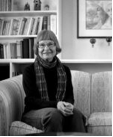What’s most exciting about this book to you?
When I began writing this novel, the childless mother was the protagonist and her urgent desire for a family would be the theme. But, to my surprise, as the story developed, it dawned on me that the Russian adopted daughter was the main character and this then modified the theme I had to rethink the narrative and direct my attention to Sofia and broaden my theme to include family building and family dynamics.
Also exciting was the response to The Russian Daughter which has been surprisingly positive. The fact that its publication coincided with the 100th anniversary celebrations of the arrival in Canada of the first trainload of Russian Mennonites escaping the Revolution helped to promote it. It was also gratifying to hear from non-Mennonite readers and book clubs who read the book, liked it, were able to identify with it in some way, and recommend it.
Do you see it as a new departure for you, a continuation of earlier work/themes, or some combination?
In some sense The Russian Daughter is a continuation of both my first novel (The Wittenbergs) and my very first poetry collection (Journey to Yalta). After writing The Wittenbergs, I hoped I’d learned something about writing long fiction and wanted to make use of that by trying a second novel. Both novels owe a debt to stories my mother told about her life as a child and teenager in Russia/Ukraine. In The Wittenbergs, those stories show up in the written school assignments of the main character, a contemporary teenager, who heard them from her grandmother. The Russian Daughter was inspired by a story my mother told me about a childless couple in the village where she lived. This story was so dramatic and in many ways tragic that I thought I only needed to write it all down. In truth, the story changed so much as I developed the characters and wove their stories together.)
Journey to Yalta is a poetic response to my mother’s stories of a family journey. undertaken around the time of unrest and Revolution in what is now eastern Ukraine—the same time and place that background The Russian Daughter. In much of my writing, it seems, I’ve been intent on making a literary home for my mother’s stories.
Do you see your work as “Mennonite,” and how or how not?
When I began writing, local Mennonite writers (Wiebe, Friesen, Brandt, had already paved the way and readers, writers and critics were paying attention to Mennonite writers. This benefitted those Menno writers who followed, maybe more than I realized. I saw myself as somewhere at the periphery of a larger community of Canadian writers in my city and in my province and did not think of myself as a particularly Mennonite writer. However, my first book had obvious Mennonite content and subsequent books also, some much less.
What themes, issues, techniques, and/or other authors were most in your mind as this project came into being?
As I’ve said above, the original theme of a woman’s yearning for a child gave way to the complexities, expectations, conflicts of building a family surfaced. I was writing a modest family story back-grounded by political turbulence. Choices I’d made regarding time and place meant I could not ignore the revolution. How to keep it from overshadowing my intimate domestic story became a challenge.
I had already read Al Reimer’s My Harp is Turned to Mourning and Sandra Birdsell’s The Russlaender. Both novels give detailed and dramatic accounts ot the revolution and its violence. That was not what I intended, or was able, to do.
What part(s) of your writing process might other writers find useful, either to imitate or to avoid?
Through most of my writing life, mornings have been the best part of the day for writing. That’s when I have most creative energy and am most productive. It’s always been difficult to write during the summer when I preferred to be outside. I never, as many writers do, set myself goals of so many hours per day spent at writing, or so many pages every day. Time spent away from writing, time spent waiting can be as important as time spent writing.
I did not keep previous drafts. I tended to write and edit in parallel. Usually I would read what I’d written the previous day and if I wasn’t reasonably pleased with it, I revised the pages before continuing. So I never had a very complete rough draft. I deleted what I didn’t like. (Occasionally, if I deleted a large chunk I might save it in case)
When I began writing, I met with various writing groups for conversation, critique exchange and encouragement. Eventually, such groups became less important and I mostly worked alone. But I showed my manuscript of The Russian Daughter to two friends and their feedback helped to make the novel better. And much shorter.
Writers develop their own techniques and practices. I’m not sure what others can learn from mine. We all learn that writing is work and if something one writes seems good, it can always become better.
Excerpt:
In the Albrecht home, the fate of the Romanovs overshadows, at least for a while, the future of Sofia and Pavel. Amalia stands a long while facing the portrait of the last Empress of Russia. Then she lifts it down, brings it to the window where light falls on the unsmiling face of the woman who is now dead. She traces the outline of that face with her finger. In the light of Alexandra’s suffering, her own problems, even those that can’t be solved or sent away, seem petty. She carries the portrait to her bedroom, wraps it in an embroidered pillowcase and buries it underneath the hem-stitched linens. From now on, whenever she walks past the mirror, she will see the faded space once occupied by the Empress. Her absence will remain a constant presence for Amalia. (160)
